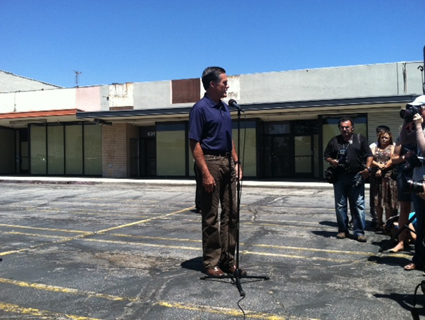
GOP Presidential candidate holds a press conference at a shuttered shopping center in North Hollywood, California in July.<a href="http://www.flickr.com/photos/mittromney/5987812310/sizes/z/in/photostream/">Mitt Romney</a>/Flickr
When given the chance to take a shot at his newly minted biggest rival, Herman Cain, Mitt Romney didn’t pass it up at Tuesday’s GOP debate. The former Massachusetts governor positioned himself as a champion of the middle class—which is why he was so adamantly opposed to 9-9-9. But when it came to an issue of serious importance for the embattled middle class—especially in Nevada, the state hit the hardest by the housing crisis—Romney punted. Rather than intervening to save underwater mortgages, Romney said, “the right course is to let markets work.”
At least he’s been consistent. Romney was offering a cliff-notes argument of a point he made earlier in the day, in an interview with the Las Vegas Review-Journal:
As to what to do for the housing industry specifically, are there things that you could do to encourage housing? One is: Don’t try and stop the foreclosure process. Let it run its course and hit the bottom. Allow investors to buy homes, put renters in them, fix the homes up and let it turn around and come back up. The Obama administration has slow-walked the foreclosure process that has long existed, and as a result we still have a foreclosure overhang. Number two, the credit that was given to first-time home-buyers was insufficient, inadequate to turn around the housing market. I think it was an ineffective idea, it was a little bit like the Cash for Clunkers program, throwing government money at something which was not market-oriented, did not staunch the decline in home values anymore than it encouraged the auto industry to take off. I think the idea of helping people refinance homes to stay in them is one that’s worth further consideration, but I’m not signing on until I know who’s going to pay, and who’s going to get bailed out.
















